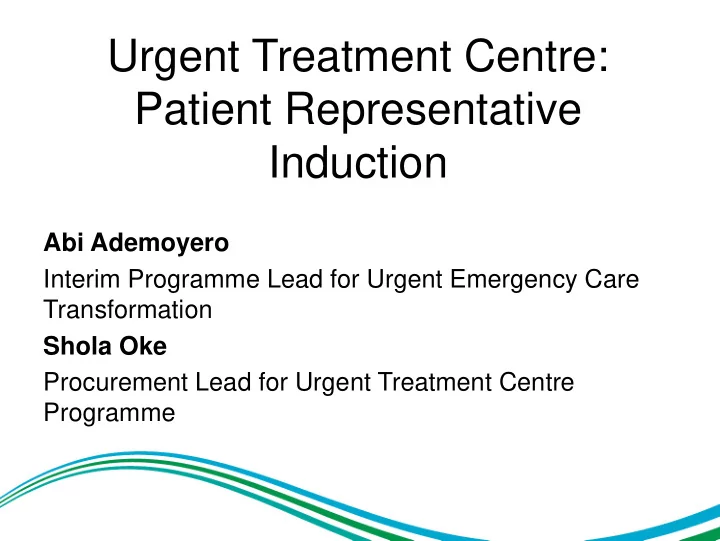

Urgent Treatment Centre: Patient Representative Induction Abi Ademoyero Interim Programme Lead for Urgent Emergency Care Transformation Shola Oke Procurement Lead for Urgent Treatment Centre Programme
Clinical Commissioning Group? • Clinical: We are led by local GPs elected by all Newham GPs and other healthcare professionals • Commissioning : We plan, buy and test the quality of local hospital, community, mental health and other NHS services on your behalf. • Group: We are accountable to you and NHS England for your local NHS services.
What NHS services do we commission (buy)?
What is an Urgent Treatment Centre? What is the difference between „Emergency‟ and „Urgent‟?
What do we hope to achieve through this procurement? • Ensure that patients are cared for in the right place at the right time and ensure that there is a clear pathway to access the UTC. • Ensure that patients have the right information about how to access the service
• Multiple walk in routes with Current state of UCC/ OOH limited navigation to out of hospital services • Over 60% attend ED without having been seen in UCC • No streaming between 12 to 8 AM- accounts for 40% of all ED attendances • Minimal redirection, UCC utilisation - 40% • Multiple contracts, Lack of data on disease types, activity types • No specific paediatric or mental health cover in UCC • Rapid Response not integrated, very low utilisation • Will not meet future 111 procurement requirements/demand • Potential Duplication of work in primary care team between UCC / OOH
Principles for urgent care pathway design • Shift activity from “walk in” to “phone first” over time and make NHS 111 the single point of access for the urgent care system. • The patient‟s own GP practice will continue to be the main point of contact during surgery hours. • Sign post patients away from the Urgent Treatment Centre to other services when this is appropriate. • Reduce the number of patients treated within the Newham Emergency Department • Support the 4hr waiting time target for the Newham Urgent Care Centre/Emergency Department. • Urgent or emergency care patients in any setting should receive the earliest possible review by a senior clinician. • Seven-day access to all relevant services in the local health and social care system, and take into account the ten clinical standards for seven day services .
Proposed Pathway for Integrated Urgent Care Patient accesses 111 via self care apps, 111 on line or phone line Blue Sections Clinical Assessment Service – NHS 111 Current 111 Early exit for Under 1's, Over 75's, EOLC, and those with a procurement Care Plan (Live) Green sections Likely to be phased Community Services approach with UTC (Community and specialist nursing, as core service, therapies etc) with potential of selecting a Rapid Response provider who would Urgent Care Centre (minor injuries and have capability to intermediate level illness) - 7 days a week Primary Care - 8 Hubs – Open 7 days a 08:00 – 00:00 deliver bolt on of week 08:00 – 20:00 Will operate like a Primary Care Hub 00:00 – 08:000 un-scheduled Diagnostics primary care in the future. Under discussion . Ambulatory Care Emergency Department (ED)
What will be different: • 111 will become the single point of access for urgent, un-scheduled care (GP OOH) • More patients will be assessed by a clinician early on in their decision to contact urgent care, i.e. through 111 Clinical Assessment Service, resulting in more patients being sent to the most appropriate service • Patient records with primary care interventions will be recorded & re-enforced by 111 CAS through information sharing. • Rapid Response will now be part of the Urgent Treatment Service to ensure patients are able to be treated at home a lot quicker. • “Traditional” out of hours will be provided at two stages, ( i) early on in the 111 pathway with clinical intervention and (ii) clinically assessed patients requiring face to face during out of hours period via base at UTC. • Transition year to be put in place, working with practices to ensure maximum benefits to practices and patients.
How have we involved people? • Collation and triangulation of existing data sources: Urgent Care Centre patient experience report from providers Health Watch Newham Urgent Care Centre reports PPE activities: NHS 111, Building Healthy Communities, Rapid Response Engagement, Transforming Services Together and primary care by community interest • UTC Procurement Patient Representatives x 2
PPE Next Steps • Bespoke community engagement with groups: older people, people with disabilities, deaf community • Engagement event in partnership with Health Watch Newham – July • UCC patient experience collation at the Mayor‟s Newham Show – July • Patient representatives on UTC procurement working group
Question and Answer
Roles of Patient representatives in the UTC procurement
Why the NHS Needs You • NHS Constitution : „NHS belongs to the people…‟ • People who live with health problems and use services are an asset • Service quality: patients see all too well what needs to improve • Strategic decisions: influence clinical and managerial leaders to hear the patient voice
Key Attributes • Ability to successfully challenge and keep meetings focused on patient experience. • Seeing the big picture/ representing the views of all people using NHS services across Newham. • Prepare for and participate in meetings, working as an equal partner with other members to find the best way forward.
What will your role be in the Procurement?
In June and July: Steering Group Meetings • What is the purpose of the Steering Group? • What is your role at the Steering Group? • Steering Group Meetings: 3 meetings every fortnight until end of July 2017
August to November: Procurement Process • How might you get involved in the procurement process? • You will need to attend procurement process training with the other members of the procurement team.
What Do We Need for Effective Patient Representation? Patient Reps’ Commissioners’ Commitments Commitments
Recommend
More recommend